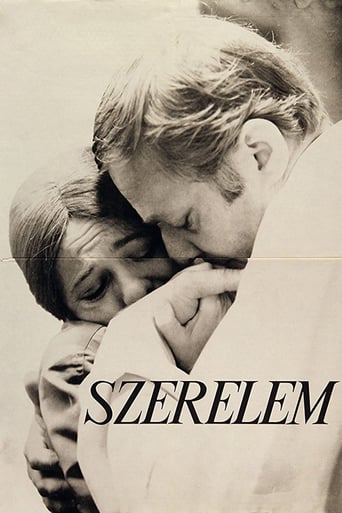vwild
Szerelem has a simple story, but to scribble down a summary is somehow to attempt to fence in with words a film that throws off definition. This is not to say that Szerelem is vague or impressionistic, rather that it is so acute a rendering of particular emotions in a particular time and place, that any description can only damage that specificity. Similarly, to try to express Szerelem's "meaning", is to attach crude slogans to its complexity. It must merely be experienced.No harm can be done by telling you that the story takes place in 1950s Hungary, that the cinematography and performances are wonderful, that the unfurling of the narrative is constantly surprising, and that the final half an hour or so is almost unbearably emotionally tense. Please remember to keep breathing during these scenes.
FilmCriticLalitRao
"Szerelem"/'Love" is considered one of the best films ever made in the history of Hungarian cinema.Its theme as well as acting performances of its main actors are so captivating that it can easily be included in the list of greatest films ever made in the history of world cinema.There are remarkable acting performances by Lili Darvas,Mari Töröcsik and Iván Darvas.However,what makes Szerelem a very special film is its ability to capitalize on a bunch of lies which are woven in its scheme of narrative elements.The whole idea of director Karoly Makk and his screen writer Peter Bacso is to suggest how far can one go with lies.One has to be genuinely artistic for having one's lies accepted by others.They chose to take inspiration from a short story by famous Hungarian writer Tibor Déry who saw worst days under communist rule when ordinary people were imprisoned without the knowledge of their relatives about their well being.This film's title love has multiple connotations.Hence,it is for viewers to make their own judgments whether they take it as a love of a mother for her son who is not present in her midst or the love of a wife for her husband who is imprisoned.
Gordon_Harker
'Szerelem' is the story of the persistence of love between two people, one of whom is imprisoned under the post war communist regime in Hungary (in this case the Kadar regime, but all the phases of Soviet engendered Hungarian communism were much of a muchness in terms of the arbitrary and unaccountable injustices which were visited on decent people - although Rakosi is the one who I would most like to bring back from the dead for all of us to punch in the face eternally until the end of time).The story is told very simply and with an extraordinary visual elegance. At first the viewer perhaps believes the relationship between the mother and Luca to be that of one of mother and daughter, but gradually it becomes clear that Luca is, in fact, the wife of political prisoner Janos, the favourite son of the dying mother, and has the objective of sustaining the life of her husband's mother with tales of his burgeoning prosperity in the US, in the (ultimately) forlorn hope that he will be released before she dies.By minimising the appearance of the authorities to just that which is required by the narrative, Makk allows us to concentrate on the minute detail of love, loss and recovery. I found the eventual encounter of the couple to have been handled perfectly in its mix of the banal and the passionate.This film is held in high regard by many, but especially those who suffered under communism, and rightly so. I almost deducted one point because I think the flashbacks could have been held a tad longer, but I think that would have been a bit churlish of me.
steveh176
This movie artfully presents a strong psychological portrait of an aging Hungarian woman and her daughter in law. The sense of realism is very strong, in spite of a rather unconventional technique of focusing on objects or cutting to memories...in fact, these occasional jerky cuts enhance the realism of the characters.It is slow paced, but very believable, and I found it to be extremely compelling to watch.

